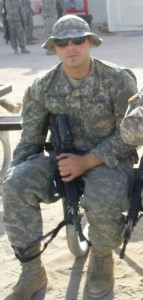I was reading a pretty interesting piece by Mary Dudziak in the California Law Review around the time that I heard we were fully pulling out of Iraq, a war that I myself fought in. Dudziak’s piece, “Law, War, and the History of Time,” is a sort of companion piece to her book War Time, and both basically put forward the argument that although wartime has traditionally been a time of “exception,” in the last ten years it’s replaced peacetime as the norm. She says in the study that “Viewing war as an exception to normal life, however, leads us to ignore the longstanding persistence of war.” A few things that make it easier to ignore something as supposedly gargantuan as a decade long war might, and I’m just guessing here, have to do with our 1) imaginary economy and 2) lack of a citizen army. We’ve never been asked to collectively sacrifice, either materially with our goods and money, or existentially with our bodies and minds.
The key word here I think is sacrifice. Randolph Bourne argued that war is the “health of the state,” because its the only singularity strong enough to draw out of us the collective experience of sacrifice. And what being willing to sacrifice one thing for another denotes is a value structure. If the American Way Of Life is worth dying for, gee, it must really be something. The logic is circular, sure, and the reasoning is tautological, and the only way to escape the catless smile of “dying for something means that that thing is worth dying for” is to imbue it with a little mysticism. It’s an apocalyptical desire that pretty much fades as soon as the shortages, pestilence, squalor, and death of friends begin.
And so keeping all of this in mind, let me make a real ass out of myself by trying to predict the future. I think that the art, especially the writing, that comes out of these wars, experienced by about 1% of 1% of the country, misapprehended by many more, and, now, ignored by a majority, will along with the political disaffection and economic dislocation of the returning soldiers, create a less outward looking art. There won’t be as much Liberal or Radical reexaminations of the sociological guts of this thing or political finger pointing. Nope. No Catch-22s or All Quiet on the Western Fronts. Instead, I think there will be a profound collapse into oneself. A folding in. Less a retreat than an avalanche or cave-in. A turn inward against a world that, even worse than just not caring, has no way of understanding.
Germans had their own similar period (1870-1933) when a term that’s kind of difficult to translate dominate art and culture. Innerlichkeit, a tendency to withdraw from or be completely indifferent to politics, instead seeking almost revelatory knowledge inside the subjective experience. The inner world being more ‘real.’ I think the best example of war writing in this vein is Storm of Steel, or Stahlgewittern, by Ernst Junger. In it, war becomes, not a confluence of political forces and personalities, but instead a sublime, mystical, and idiosyncratically individual experience. He’s all about the elevation of war to a completely internal event. And in its way, it’s a pessimism that can only truly be understood outside of itself, almost by definition.
I make this prediction because I fight against these tendencies in myself. I know, that’s a very American reason to reach a German conclusion, but there it is. And so here’s another 1%, a forgotten minority, alienated from the rest of the generation, lost and apart. The war is over, a few of my friends are dead, and I never really wanted a parade anyway.
This post may contain affiliate links.









